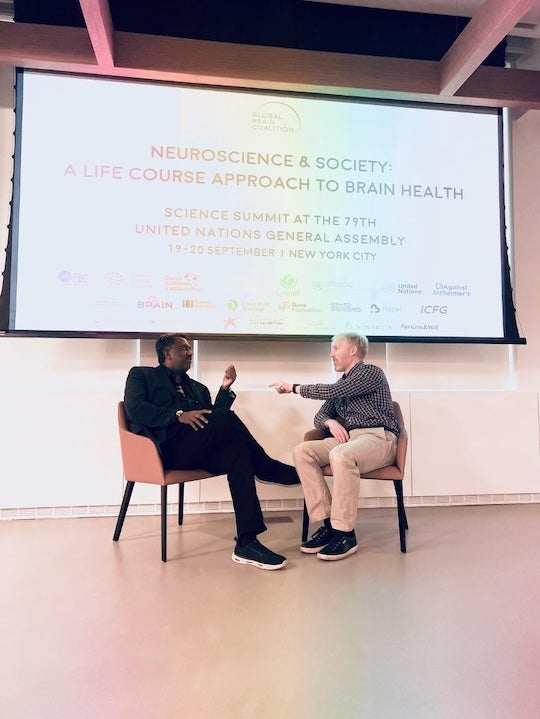Neuroscience experts from government, business, finance, banking and philanthropy came together at the inaugural Brain Days of the 79th United Nations General Assembly Science Summit to discuss the global “brain economy transformation.” The role of the human brain in the wider economy is drawing increased attention, and brain capital is becoming a priority for nations, businesses and individuals.
The Office of Innovation at Rice University and the Neuro-Policy Program of Rice’s Baker Institute for Public Policy co-organized the events to convene thought leaders and stakeholders from across the world to catalyze global advancements in areas such as technology and health care.
“Rice is at the forefront of the brain economy also known as the brain-positive economic transformation,” said Paul Cherukuri, Rice’s chief innovation officer and vice president for innovation, in his opening remarks on Day 1. “This transition is complex and will require a systems approach. Incremental change will not be sufficient, and there are few silver bullets.

“We aim to stop and reverse the loss of brain capital through pioneering efforts such as the Neuro-Policy Program. This program drives systems change by learning about ingredients for transformation, assessing barriers to be removed as well as catalyzing change with partners and coalitions vying for a new way forward. Today is a testament to the program’s success as we integrate new neuroscience-inspired policy approaches at the global scale.”
In August, Rice and the Baker Institute hosted the “American Brain Economy” event with U.S. Rep. Morgan Luttrell (8th District-TX), Texas State Representative Dr. Greg Bonnen and NIH BRAIN Initiative Director John Ngai. The guests toured the Rice Neuroengineering Initiative and Neuroplasticity Labs. Afterward, a series of keynotes and panels discussed how the U.S. can safeguard brain capital for both economic and national security.
Cherukuri explained that brain health disorders are impacting the economic security of nation states. According to data from the Institute for Health Metrics and Evaluation’s Brain Health Atlas, the cost of these disorders is $2.2 trillion and growing at about 5% per year. This forecast is a stark reminder of the critical need to comprehensively address neurological and mental health issues at a systems level, Cherukuri said.
“It is essential that we not only invest in this research but that we also develop the next generation of scientists,” he said. “This means investing in our educational systems as well. Unfortunately, the global education system has significant hurdles. There are key skill deserts across the world where access to high-quality education and training is limited. This is occurring at a time when our brain capital, our brain health, our brain skills, are more crucial than ever.”

The Neuro-Policy Program is an interdisciplinary approach to addressing brain health challenges and advancing economic opportunity. The program led by Harris Eyre, senior fellow at the Baker Institute, is at the forefront of pioneering data analysis, empirical research and policy application.
“For each of these factors, we try to identify how close they are to positive tipping points and what are the barriers that we could help remove to cross these tipping points,” Eyre said. “Sometimes this will involve investing in basic research, sometimes through demonstrating success in pilot projects, sometimes through public policy design and lobbying, sometimes through monitoring and transparency.”
Eyre said the rewards for reaching a “brain healthy” state are enormous.
“If we have this successful brain economy transition, we’re unlocking people’s brain health so that kids can learn better, people in the workplace can upskill and reskill, and that gives us what we need for other skill-based activities such as science and technology, supercomputing, clean energy innovation, etc.,” Eyre said. “That’s the model New York Gov. Kathy Hochul, Cameroon President Paul Biya, Indian Government Brain Health Task Force Chair Rajinder Dhamija, European Investment Bank Institute Dean Shiva Dustdar and I are aligned on.”
The Neuro-Policy Program co-authored the Yaoundé Declaration on the Brain Economy, which has been endorsed by Biya, who is leading the presidency of the 79th U.N. General Assembly.
Learn more about Brain Day 1 here and Brain Days 2 and 3 here.

